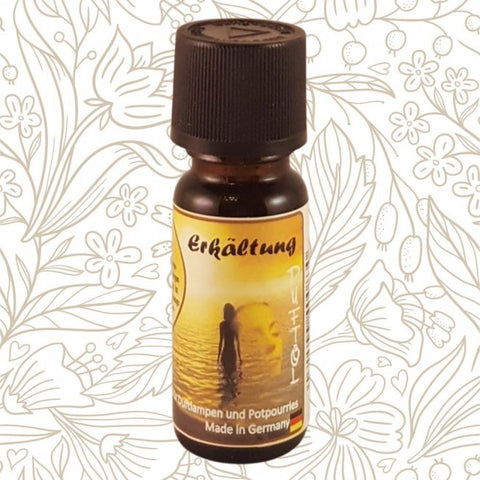When it comes to colds, a scented oil can work wonders. But which fragrance oils are best for colds? There are so many options on the market that finding the perfect oil for your needs can be difficult.
The good news is that there are some scented oils that are particularly effective for colds. In this article, we're going to review some of the best scented oils for colds and how they can help you relieve your symptoms and heal faster. Read on to find out more!
Various essential oils can help with a cold, such as eucalyptus oil, thyme oil, peppermint oil or tea tree oil. Eucalyptus oil helps relieve nasal congestion, while thyme oil has antibacterial properties and can provide cough relief. Peppermint oil relieves headaches and tea tree oil strengthens the immune system. It is advisable to vaporize the fragrance oil in an aroma lamp or to put a few drops on a handkerchief and inhale.

Which fragrance oil for a cold?
1. What is a fragrance oil?
Fragrance oils are liquid plant extracts obtained from herbs, flowers, fruits and other plants. They are commonly used in aromatherapy and can help with various health conditions.
Fragrance oils can be used in a variety of ways, such as inhaling, rubbing on the skin, or adding to a bath. They are often used in diffusers to fill the room with their scent and create a relaxing atmosphere.
2. How can fragrance oils help with a cold?
Fragrance oils can help with colds in a number of ways. Some fragrance oils have antiviral and antibacterial properties that can help fight off pathogens and boost the immune system.
Other scented oils can help relieve symptoms of a cold, such as a stuffy nose, cough, and sore throat. Some fragrance oils also have calming properties that can help reduce stress and anxiety that often accompanies the common cold.
3. Which fragrance oils are particularly effective for colds?
There are a variety of scented oils that can help with colds. Some of the most effective are:
– Eucalyptus Oil: Eucalyptus oil has antiviral and antibacterial properties and can help relieve nasal congestion and cough.
– Tea Tree Oil: Tea tree oil has powerful antiviral and antibacterial properties and can help fight off pathogens and boost the immune system.
– Peppermint Oil: Peppermint oil can help relieve nasal congestion, headaches and make breathing easier.
- Lavender Oil: Lavender oil has calming properties and can help reduce stress and anxiety that often accompanies the common cold.
4. How are fragrance oils used?
Fragrance oils can be used in a variety of ways, depending on the symptoms to be alleviated. Some of the most common uses are:
- Inhale: A few drops of fragrance oil can be added to a bowl of hot water and then gently inhaled. Alternatively, fragrance oils can be used in a diffuser or an inhaler.
- Rub in: A few drops of fragrance oil can be mixed with a carrier oil such as almond oil and then applied to the skin. This can help reduce pain and inflammation.
- Bathing: A few drops of essential oil can be added to bath water to create a relaxing atmosphere and relieve the symptoms of colds.
5. Are there any side effects from using fragrance oils?
Although fragrance oils are generally safe, they can cause allergic reactions or other side effects in some people. It is important to follow the directions for using fragrance oils carefully and to consult a doctor or an experienced aromatherapist if you have any concerns.
It is also important to ensure that the fragrance oils are of high quality and do not contain any harmful additives.
6. How to choose the right fragrance oil for colds?
Choosing the right fragrance oil depends on the individual symptoms and needs. Some fragrance oils may be more effective than others for certain symptoms.
It is also important to ensure that the fragrance oil is of high quality and does not contain any harmful additives. It is advisable to buy fragrance oils from a trustworthy supplier and to look for organic quality.
7. Benefits of using scented oils for colds
Using scented oils can provide a variety of benefits for colds, such as:
- Relief of symptoms such as nasal congestion, cough and sore throat.
– Strengthening of the immune system and defense against pathogens.
– Reducing the stress and anxiety that often accompanies the common cold.
– Creating a relaxing atmosphere that can aid in recovery.
8. Comparison of different fragrance oils for colds
Here is a comparison of some of the most popular scented oils for colds:
| fragrance oil | Effect | Application |
|——–|——–|———–|
| Eucalyptus Oil | Antiviral, Antibacterial | Inhale, rub in, bathe |
| Tea Tree Oil | Antiviral, Antibacterial | inhale, rub in |
| Peppermint Oil | Stuffy nose, headache | Inhale, rub in, bathe |
| Lavender Oil | Soothing, relaxing | Inhale, rub in, bathe |
9. Tips on using scented oils for colds
Here are some tips for using scented oils for colds:
– Follow the directions for using fragrance oils carefully.
– Buy high quality and organic quality fragrance oils.
– Avoid using fragrance oils in children under the age of 6 without medical advice.
– Avoid using fragrance oils during pregnancy without medical advice.
10. Conclusion
Fragrance oils can help with colds in a number of ways, such as relieving symptoms, boosting the immune system, and reducing stress and anxiety. It is important to follow the directions for using fragrance oils carefully and to consult a doctor or an experienced aromatherapist if you have any concerns.
frequently asked Questions
Here you will find answers to frequently asked questions about “Which fragrance oil for a cold?”
1. Which fragrance oils are best for colds?
There are some scented oils that can help with colds. Eucalyptus oil, tea tree oil, and peppermint oil are some of the best options. Eucalyptus oil is known for its anti-inflammatory and expectorant properties, tea tree oil has antibacterial properties, and peppermint oil helps open the airways and make breathing easier.
You can also use a mixture of different oils for a stronger effect. However, it is important to only use high-quality, natural oils and apply them diluted to the skin or use them in a diffuser.
2. How to use scented oils for colds?
There are several ways to use scented oils for colds. A popular method is to use a diffuser to spread the scent around the room. Another option is to apply it directly to the skin, but the oil must always be diluted to avoid skin irritation.
Another way to use fragrance oils is through inhalation. To do this, you can add a few drops of oil to a bowl of hot water, hold your head over the bowl, and inhale the rising steam. You can also put a few drops of oil on a handkerchief and hold it near your nose to enjoy the benefits of the scent.
3. Are fragrance oils safe for colds?
Yes, scented oils are safe for colds as long as they are used properly. It is important to only use high quality, natural oils and always dilute them before applying them to the skin.
It's also important to be careful not to get the oils in your eyes or mouth. If you are pregnant or have certain medical conditions, you should consult your doctor before using fragrance oils.
4. How often should you use scented oils for colds?
The frequency of using scented oils for colds depends on the individual situation. Some people find it helpful to use the oils throughout the day, while others only use them in the evening or at night.
It's important to pay attention to your body's response and reduce your use of oils if you notice any adverse effects.
5. Can you also use scented oils for children with colds?
Yes, fragrance oils can be used on children, but it's important to dilute the oils and only use high-quality, natural oils.
It's also important to make sure the child isn't allergic to certain oils and that the oils don't get in their eyes or mouth. It's best to check with a pediatrician or aromatherapy professional before using scented oils on children.

In summary, when you have a cold, scented oils are a natural and effective way to relieve its symptoms. There are many different fragrance oils that can have different effects. It's important to choose the right oil for your specific symptoms.
Whether you have a stuffy nose, suffer from a cough or just want to improve your mood, there is a fragrance oil that can help. However, you should always make sure to dilute the oil and not apply it directly to your skin to avoid irritation.
Overall, it's a good idea to keep a selection of scented oils on hand for quick and easy natural relief in the event of a cold. Try different oils to find out which ones work best for you. With a combination of scented oils, rest and sufficient fluids, you can get over your cold faster and feel better again.


